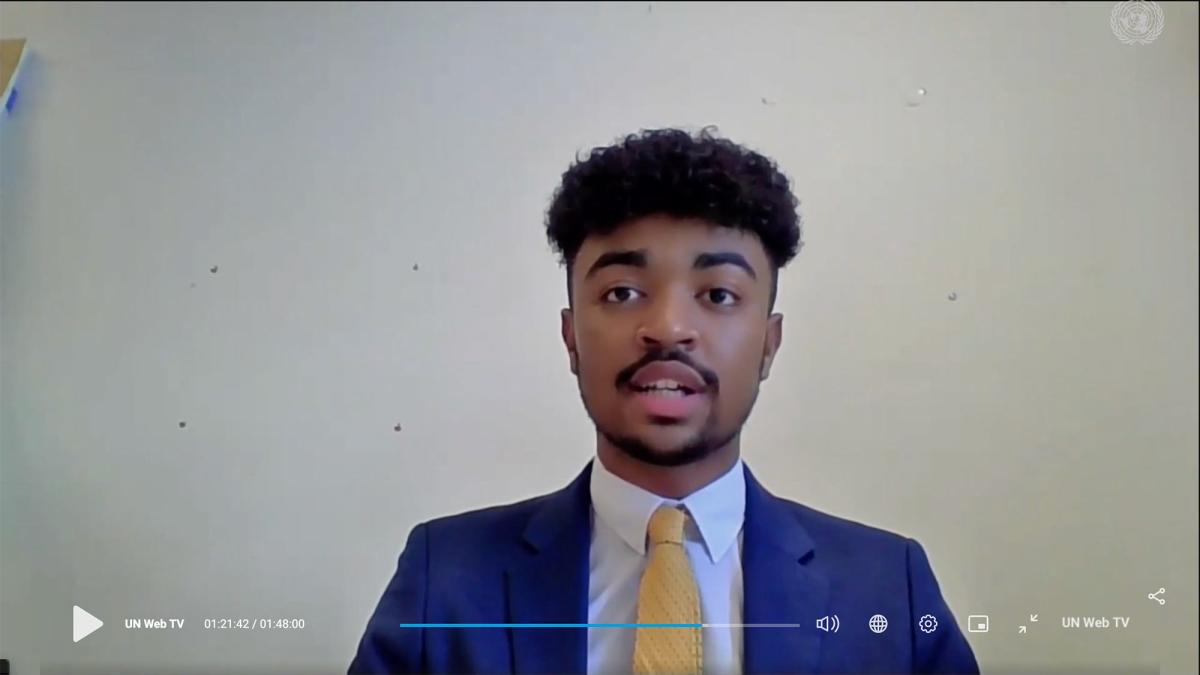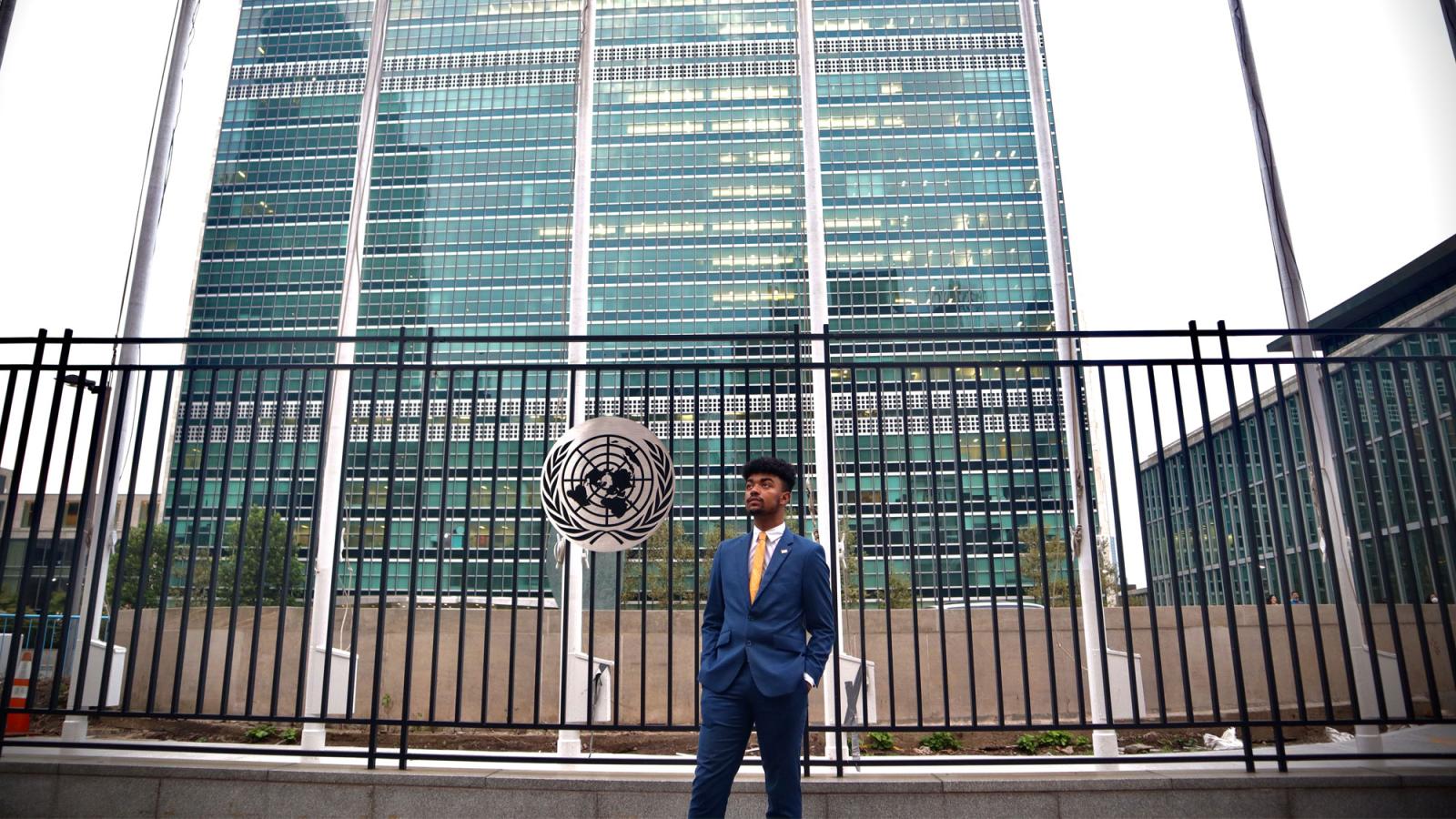
Dyson Delivers Statement to UN

This fall, Dyson students took their coursework beyond the classroom walls, tackling real-world issues and presenting to global policymakers.
In Professor of Political Science Matthew Bolton’s, PhD, class, delivering a statement to the United Nations is considered coursework.
For the past several years, Pace University’s International Disarmament Institute, the Political Science Department, and the Peace and Justice Studies program have collaborated to craft a joint statement on youth engagement and disarmament education to deliver to the UN’s First Committee during the General Assembly session.
This fall, students in Bolton’s political science class, titled “The Global Politics of Disarmament and Arms Control,” analyzed past statements, General Assembly resolutions, and policy briefing papers to help create this year’s statement, which was delivered on Friday, October 8. Because non-governmental agencies are generally allotted only a short window of time during the session, the statement’s purpose is to represent the position of many groups advocating for youth issues and disarmament education, which focuses on the reduction, control, and elimination of weapons to prevent armed conflict.
Taylor Mangus ’23, Political Science, and Jeremiah Williams ’23, Political Science and Communications, led the effort in collecting research and information from their classmates and reaching out to activists and organizations who are focusing on these issues, nationally and internationally.
“We had to work on getting all of those actors their requested piece of material in the written statement and then extrapolate all of that out and see what we’re going to say,” said Williams. “How are we going to make it impactful? How are we going to make our voices heard?”
The draft that Mangus and Williams crafted was distributed to their classmates and the organizations involved for input and then refined by Mangus, Williams, and Bolton. The final statement centered around the impact of nuclear violence on today’s youth around the globe, underlining the notion that the diversity and intersectionality of young people’s experiences and identities affect the narrative. It urged the First Committee to support and fund disarmament education, as well as to pass this year’s “Youth, disarmament and non-proliferation” resolution, including linkages to other issues such as the COVID-19 pandemic and climate change.
“One of the biggest challenges I faced when writing the statement was to represent the experiences of people who I had not encountered the same life experiences as,” said Mangus. “It was a very eye-opening experience to touch on the importance of people who are often forgotten in the discussion around disarmament.”
Once finalized, the statement was then signed by 34 global civil society organizations, including two Nobel Peace Prize Laureates.
My hope is that the experience can show students that there are opportunities to influence the world around them and help them learn tools in advocacy and diplomacy.
—Professor Matthew Bolton, PhD
In participating in this experience, Pace students like Mangus, Williams, and their classmates are presented the unique opportunity to bring their coursework to life in engaging and tangible ways, using classroom concepts to tackle crucial current issues and affect real change.
“My hope is that the experience can show students that there are opportunities to influence the world around them and help them learn tools in advocacy and diplomacy,” said Bolton. “It can give students insight into how the institutions they are learning about in class actually function.”
In addition to the longer, written statement, Mangus and Williams worked to create the shorter, punchier version that was delivered via Zoom to the First Committee. Williams, selected by his classmates and the Peace and Justice Studies program to present the statement, then put on the finishing touches, using his public speaking background as the president of Pace Debates, the University’s student debate team, to finesse the language and delivery.
“After it was done, I took a deep breath, and I was like, ‘I did it. It’s over. The statement has been delivered. This is now part of history, it’s in the record. Your footprint has been made,’” said Williams, who delivered his speech in a blue suit and yellow tie to represent Pace’s colors. He also mentioned that, immediately upon the conclusion of the statement, Professor Bolton was receiving praise on social media from the organizations that had contributed, applauding how well the statement and Williams’s delivery represented their position.
“This statement is not only a fantastic experience for Pace students, but it is really important for the United Nations to hear the voices of youth and to take them seriously as experts who have very real stakes in the work of the UN,” said Emily Welty, PhD, professor of women’s and gender studies and director of the peace and justice studies program. “What I found so compelling about Jeremiah and Taylor’s statement was that it demonstrated that the work of First Committee cannot be left to diplomats alone but involves all of us.”
After delivering this statement to the UN, Williams and Mangus also addressed First Committee diplomats and civil society advocates at an event on youth inclusion at New York’s Yale Club, an event that also included international ambassadors and UN representatives as fellow speakers.

Then, in early November, thanks in large part to work from advocates like Williams and Mangus, the First Committee unanimously adopted its biennial “Youth, disarmament, and non-proliferation” resolution. The new version extends beyond the 2019 version, notably including a request that the UN Secretary General “seek the views” of member states, the UN, international organizations, and civil society on youth engagement activities surrounding disarmament and submit a report to the General Assembly in 2023.
Throughout this experience, Williams and Mangus both expressed gratitude for the opportunity to take their coursework beyond the walls of a Pace classroom and (virtually) into the chambers of one of the world’s most powerful organizations.
“I personally feel more inspired than I ever have,” said Williams. “I’ve found being in the Political Science Department at Pace really rewarding because a lot of the professors are working with the United Nations or are doing independent work or research that I can see and can be a part of.”